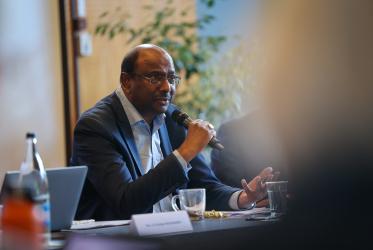The general secretary of the World Council of Churches (WCC), Rev. Dr Olav Fykse Tveit, on 3 June spoke to a United Nations conference in Geneva, where he addressed “the role of religion in the search for justice and peace.”
The conference at the Palais des Nations, Geneva, was called by UN Geneva director general Kassym-Jomart Tokayev in search of “a comprehensive framework” or new paradigm for UN work with its partners in the areas of global economy, ecology, education, health, security, and governance.
Calling for “an open, proper, critical and constructive reflection on the role of religion in our work for justice and peace and in our local and global life together,” Tveit urged the international community to grapple more deeply with religion. “It must go beyond discussions about ‘misuse’ of religion,” he said.
“It must also include a self-critical reflection on what our religions are teaching and representing today.”
Addressing the ambiguity of religion and religious traditions, Tveit noted that religion “is often employed to legitimize injustice and violence.” Indeed, he said, “There is no authority given to anybody to do evil in the name of religion.”
Yet Tveit also noted the ultimate accountability of religion and the vast potential of faith commitment for aiding the common good.
“I believe, and I have seen, that religious faith and practice can make the most committed and powerful contributions to reconciliation and to economic justice,” he said.
Tveit cited ongoing work of the WCC with key units of the UN, particularly in collaborative projects with the World Health Organization (WHO) on HIV, with the International Labour Organization (ILO) on the Decent Work initiative, and with the United Nations High Commissioner for Refugees (UNHCR) on migration and refugees.
Tveit also stressed the ongoing commitment of the WCC in the international arena, saying, “Over six decades, the WCC has contributed in many ways to the emergence of a global civil society. This is where I see our call today.”









